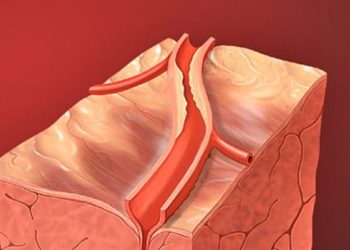Noninvasive ventilation techniques similar for preterm infants
Image: PD
1. Bronchopulmonary dysplasia (BPD) rates were similar in high-risk preterm infants treated with nasal intermittent positive pressure ventilation (IPPV) versus nasal continuous positive airway pressure (CPAP).
2. Rates of neonatal complications were similar between the two groups as well.
Evidence Rating Level: 1 (Excellent)
Study Rundown: Bronchopulmonary dysplasia (BPD) is the most common complication in preterm infants and is a leading cause of early death. Tracheal intubation and mechanical ventilation is thought to increase lung inflammation and injury, altering normal lung development and leading to the development of BPD. Thus, lung protective ventilation such as nasal continuous positive airway pressure (CPAP) and intermittent positive-pressure ventilation (IPPV) have been increasingly used to decrease the incidence of BPD. Nasal IPPV is frequently chosen over CPAP, despite the lack of consistent evidence demonstrating its superiority. This study found that nasal IPPV and CPAP were associated with similar rates of BPD in preterm infants. A blinded standardized test was used in this trial to assess the development of BPD, allowing for a more consistent definition than that used in previous studies. However, differences still existed in device choice and the use of flow synchronization with IPPV. Larger randomized trials are needed to evaluate the differences between these various modes of ventilation.
Click to read the study in NEJM
Relevant reading: Lung protective ventilation in extremely preterm infants
In-Depth [randomized controlled trial]: Infants with a birth weight of less than 1000 g and gestational age of less than 30 weeks were screened for eligibility at 34 tertiary care neonatal intensive care units in 10 countries. 1009 enrolled infants were randomized to treatment with nasal IPPV or nasal CPAP. Respiratory therapists who were blinded to group assignments assigned the diagnoses of BDP. The rate of death or BPD was 38.4% in infants treated with IPPV and 36.7% in infants treated with CPAP. The adjusted odds ratio was 1.09 (95% CI, 0.83 to 1.43).
58.3% of infants did not respond to noninvasive support and required intubation in the nasal IPPV group as compared to 59.1% in the nasal CPAP group. The two groups did not differ significantly in rates of complications due to treatment.
By Xu Gao and Mitalee Patil
© 2013 2minutemedicine.com. All rights reserved. No works may be reproduced without expressed written consent from 2minutemedicine.com. Disclaimer: We present factual information directly from peer reviewed medical journals. No post should be construed as medical advice and is not intended as such by the authors, editors, staff or by 2minutemedicine.com. PLEASE SEE A HEALTHCARE PROVIDER IN YOUR AREA IF YOU SEEK MEDICAL ADVICE OF ANY SORT.






